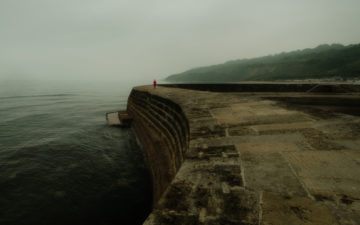by Chris Horner
 They all want it: the ‘digital economy’ runs on it, extracting it, buying and selling our attention. We are solicited to click and scroll in order to satisfy fleeting interests, anticipations of brief pleasures, information to retain or forget. Information: streams of data, images, chat: not knowledge, which is something shaped to a human purpose. They gather it, we lose it, dispersed across platforms and screens through the day and far into the night. The nervous system, bombarded by stimuli, begins to experience the stressful day and night as one long flickering all-consuming series of virtual non events.
They all want it: the ‘digital economy’ runs on it, extracting it, buying and selling our attention. We are solicited to click and scroll in order to satisfy fleeting interests, anticipations of brief pleasures, information to retain or forget. Information: streams of data, images, chat: not knowledge, which is something shaped to a human purpose. They gather it, we lose it, dispersed across platforms and screens through the day and far into the night. The nervous system, bombarded by stimuli, begins to experience the stressful day and night as one long flickering all-consuming series of virtual non events.
The result is that we find it hard to focus, to concentrate on one thing for longer than about 3 minutes. The repeated dispersal of attention, the iterated jumps and clicks of the wired individual making it harder to gather our dispersed attention in order to do anything like genuine contemplation or the relaxed appreciation of what we view or hear. It’s a familiar complaint: the spaces of leisure that might once have been the beyond the reach of of work, of consumption and gossip, are erased.
I want to suggest a few things here. One is that something has gone strangely awry with the possibilities of leisure, another that there is an existential problem that is connected to the diversion and dispersal of desire. Finally, that there are some important things the subject of all this digital attention needs to do, and that that is more than just disconnecting (although that might be a good idea too).
First, leisure. Otium, for the ancient Greeks. Aristotle tells us:
All of life can be divided into work and leisure, and war and peace; and of actions, some aim at what is necessary and useful, while others aim at what is noble…Just as war is for the sake of peace, so work is for the sake of leisure and what is necessary and useful is for the sake of what is noble…One should be able to work and go to war, but should rather prefer to remain at peace and be at leisure, and accordingly, one should act with a view to what is necessary and useful, but, more so, with a view to what is noble…Nature itself aims not only at the correct use of work but also at the capacity for noble leisured activity. Since such activity equates to flourishing, it is the starting point for everything else…
– Aristotle, Politics (1333a30-b3)
‘Noble leisure’: not the usual way to view time off. Let’s not forget that this noble leisure was something only available to a very few financially independent free men in his day, and that it remains beyond the reach of too many people in our time. Assuming, though, that something like time for oneself is within our reach, what could noble leisure be for us? Not scrolling down a screen, probably. For Aristotle it is surely connected to the notion of doing something for its own sake, rather than for some extrinsic goal. So making a table has the goal at the end of it – the finished table, the useful thing, while dancing is an activity which is the thing itself: there is nothing apart from the dance. And for Aristotle, it isn’t the same as amusing oneself, entertainment aimed at distraction from the strain of work.
 While for Aristotle (and for Hannah Arendt in the 20th century, who follows him in this), there is nothing to be condemned in the amusement of entertainment, it isn’t the same as noble leisure. What makes some leisure ‘noble’ and some not? It’s tempting to think that if such a distinction is viable at all, it must be based on the object of one’s attention. So reading Proust or learning Latin might be noble, while cooking a stir fry wouldn’t be. But I doubt that. I’d suggest that the quality of one’s attention matters more than its object. Here we can see a distinction worth making in ‘the digital age’. The same medium that enables labour to invade life 24/7 tends to substitute ‘amusement’ for genuine leisure, noble or otherwise. Again: there is nothing wrong with entertainment. But the way it often comes to us, fast and with flashing lights and a beat, often generates not pleasure but boredom: idle scrolling or flipping between competing, unfinished promises of fun. And still we scroll on, looking for another brief burst of …something, which doesn’t satisfy. The result is what Mark Fisher named depressive hedonism.
While for Aristotle (and for Hannah Arendt in the 20th century, who follows him in this), there is nothing to be condemned in the amusement of entertainment, it isn’t the same as noble leisure. What makes some leisure ‘noble’ and some not? It’s tempting to think that if such a distinction is viable at all, it must be based on the object of one’s attention. So reading Proust or learning Latin might be noble, while cooking a stir fry wouldn’t be. But I doubt that. I’d suggest that the quality of one’s attention matters more than its object. Here we can see a distinction worth making in ‘the digital age’. The same medium that enables labour to invade life 24/7 tends to substitute ‘amusement’ for genuine leisure, noble or otherwise. Again: there is nothing wrong with entertainment. But the way it often comes to us, fast and with flashing lights and a beat, often generates not pleasure but boredom: idle scrolling or flipping between competing, unfinished promises of fun. And still we scroll on, looking for another brief burst of …something, which doesn’t satisfy. The result is what Mark Fisher named depressive hedonism.
Our desires are being colonised and manipulated. The effect of the digital funhouse is that of an unending demand that we enjoy our selves in ways prescribed from without and not within. We must want what others seem to want. Now it is the case that all desire is at some level the ‘desire of the other’: from early in life we learn from others what to want. Desire is contagious. Still, somewhere in me is a place where I can discover my own, my singular desire for this thing, that matters to me, even if it is nothing to anyone else. The problem is that the ‘Big Other’, the social authority that determines and promotes what one ought to desire, sweeps all before it. In a commodity driven world like ours, that is often shiny glittery things we are solicited to buy, none of which can keep us happy for long. There is always the Next Thing, and perpetual dissatisfaction. The hyper commodified attention economy exerts massive pressure to become a distracted consumer of fantasy objects. So the Desire of the Other occludes one’s own deepest desires. It is a truly existential question to ask: what is it I really want? It might be an awkward thing, at variance with the morals or prescriptions of the Big Other. It may even be to realise that ‘the Big Other does not exist’ (as Lacan puts it), that there is no unified authoritative source of what the correct desires are. How can we begin to do this?
There is no simple recipe. But there may be some ways to reclaim ‘noble leisure’ and find the time and space to discover and assert one’s own Desire. One way may be to put contemplative absorption back into one’s life. Instead of dispersing attention, gathering it and directing it to a point, a still centre. Some ways to this are ordinary and accessible. Examples might include quietly absorbing activities like cooking, or carpentry or gardening, making art, like painting (or in my case, landscape photography), or writing. The sense of being completely taken up with a task that requires one’s attention, yet allows too, the opportunity for reverie, a kind of thoughtful daydreaming. Perhaps this departs a bit from what is called ‘mindfulness’, as one is doing one thing while letting the mind to drift slowly like a summer cloud in a light breeze. This is time for oneself, and its value shouldn’t be underestimated.
Such activity, though, does have an end in view: the table, the flowerbed, the painting. Provided the end does not become a kind of demand that imposes a ‘hurry up’ regime doing something in this way, whatever it is, can still refresh and restore. But there are other ways of being with oneself that don’t involve ‘doing’.
 One is the slow contemplation of art. Reading a novel might seem to be the obvious thing. But the practice of reading well and not just skimming or accelerating to get to the end is worth developing. So reading poetry may be a good alternative. With no narrative, and packed with meaning: images, metre, rhythms, associations, a good poem demands a slow absorption and rereading. The same applies to looking and listening. Apparently, the most popular painting in London’s National Gallery is Constable’s The Hay Wain. The average time spend looking at it is 30 seconds. This is not the looking that sees: it is mere glancing. Music too, is a wonderful way of contemplating structure and complexity in time. What one listens to will be less important that how. I am inclined to think that to really achieve an absorption of the kind I am advocating, there needs to be some complexity and development, but this may not always be so. Schubert’s Notturno, Miles Davis’ Shhh, Peaceful, or Phillip Glass’s piano music are examples of the kind of music one can let one’s mind dwell with. Whether it is obviously complex and thus needs one’s full attention to structure, shape and composition, or calmly relaxing, what one is looking for is something to be absorbed by the whole mind. Art requires time, time that is gathered in and brought to a kind of focused point. And as we see or hear that art, it can make changes in us, and might even demand, as Rilke’s poem has it ‘you must change your life’. But this will require more than the 30 seconds of the hurried tourist.
One is the slow contemplation of art. Reading a novel might seem to be the obvious thing. But the practice of reading well and not just skimming or accelerating to get to the end is worth developing. So reading poetry may be a good alternative. With no narrative, and packed with meaning: images, metre, rhythms, associations, a good poem demands a slow absorption and rereading. The same applies to looking and listening. Apparently, the most popular painting in London’s National Gallery is Constable’s The Hay Wain. The average time spend looking at it is 30 seconds. This is not the looking that sees: it is mere glancing. Music too, is a wonderful way of contemplating structure and complexity in time. What one listens to will be less important that how. I am inclined to think that to really achieve an absorption of the kind I am advocating, there needs to be some complexity and development, but this may not always be so. Schubert’s Notturno, Miles Davis’ Shhh, Peaceful, or Phillip Glass’s piano music are examples of the kind of music one can let one’s mind dwell with. Whether it is obviously complex and thus needs one’s full attention to structure, shape and composition, or calmly relaxing, what one is looking for is something to be absorbed by the whole mind. Art requires time, time that is gathered in and brought to a kind of focused point. And as we see or hear that art, it can make changes in us, and might even demand, as Rilke’s poem has it ‘you must change your life’. But this will require more than the 30 seconds of the hurried tourist.

Finally, I’d suggest something both very simple yet endlessly wonderful. Walking. ‘Going for a walk’ has a banal sound to it, like walking down the mall to buy a t shirt, but it can be vastly more than that. In the city one can be a flâneur, drifting through the streets, contemplating the crowds and the urban scene. Yet I think walking in nature is more likely to encourage contemplative absorption, walking, not to get anywhere in particular, free from emails and messages. Contemplation and conversation can flourish there. It is an old, obvious and very real way to be with and by oneself, to meditate, to see and hear a world that lies beyond the babble of the digital arcade. I don’t know if Aristotle would think it was noble, but I recommend it.
Books consulted:
Aristotle: Nicomachean Ethics, and the Politics. (Oxford Worlds Classics)
Hannah Arendt: The Human Condition. (University of Chicago Press)
Mark Fisher: Capitalist Realism: Is There No Alternative? (Zero Books)
Mari Ruti: Distillations: Theory, Ethics, Affect. (Bloomsbury Academic)
Todd McGowan: Capitalism and Desire: the Psychic Cost of Free Markets. ( Columbia University Press)
Neil Postman Amusing Ourselves to Death (Penguin Books)
Byung-Chul Han: The Scent of Time: A Philosophical Essay on the Art of Lingering (Polity Press)
Rilke: ‘you must change your life’ is in his Archaic Torso of Apollo, and there are many excellent translations of the poem available.
All photographs are by the author
